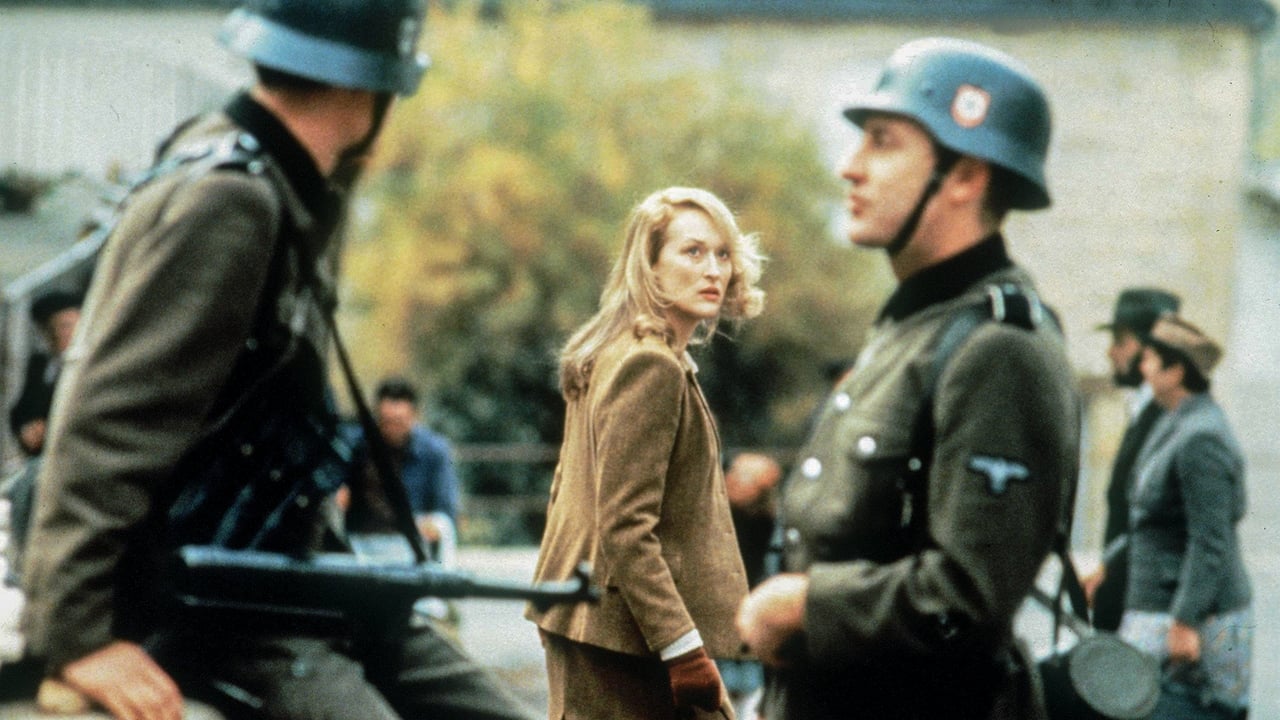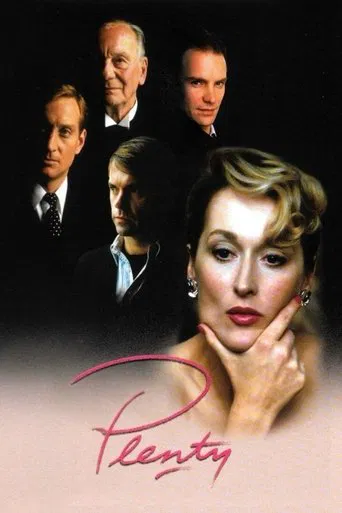

Wonderful character development!
... View MoreWhy so much hype?
... View MoreThere is, somehow, an interesting story here, as well as some good acting. There are also some good scenes
... View MoreIt's a good bad... and worth a popcorn matinée. While it's easy to lament what could have been...
... View MorePlenty is one of my all-time favourite films. I loved this movie.I understand why many people did not like it, but I think they should have another look. Sure, it is not an easy movie to watch, and Meryl Streep's character is not the most pleasant woman in the world, but that is part of the point. "Plenty" is unabashedly unsentimental, and that is one of its greatest strengths.Meryl Streep gives one of her best performances, and it's not only because of her flawless British accent. That is just the surface of Ms. Streep's complete, and absolutely brilliant transformation into a very complicated character. She is also sexier than she has ever been on screen up to that time. She looks simply beautiful!!This film is about as performance-oriented as films get, and it is full of great performances -the entire cast is excellent!!"Plenty" is a movie about how different life can turn out from the way we plan it. It is not supposed to be cheerful. It is gritty, gripping, and extremely powerful. It portrays the hardships of Resistance era France, and the harsh realities of Britain immediately after the Second World War; as well as the decadence that prosperity can bring, and the disappointments of life, and how the inability to deal with them can destroy a person's sanity.Of particular note are Charles Dance, as Streep's husband, Sam Neil as her lover, Sting and Tracey Ullman in small but important supporting roles, and especially Sir John Gielgud, who effortlessly steals the few scenes he is in. In one of the movie's few comic moments, Mr. Gielgud corrects the wife of a Burmese diplomat just as he is leaving a dinner party on the nationality of a certain European film director. Just this scene makes the movie worth watching!I have seen this movie described as an underrated tour-de-force. That is an extremely fitting description. I would add the word classic to that description. This is a film that challenges the viewer to sit through its grim depictions of what life can be like if we don't know how to deal with life not turning out like we want it to. Depicting different eras from the Second World War to the early to mid sixties, "Plenty" is a period piece with painstaking recreations and some incredible locations in England, France and Jordan.If someone has not seen this movie, I urge them to buy it or rent it and watch it. For a long time, this film was not available in widescreen on home video. Now there is at least one widescreen DVD which restores the film to its stunning beauty and allows us to enjoy its excellent cinematography. To anyone who appreciates great acting, this film is a MUST SEE. No serious film collector should be without this great classic.If someone has seen it but did not like it, I urge them to watch it again, and again.I have seen this film at least 50 times, and I could easily watch it 50 times more.
... View MoreSpoiled right from the start, from scene one but when our heroine decides to have a histrionic fit while hiding from a German patrol, I quickly lost interest.This inattention to detail in the interest of character development, is just poor direction. So she was frightened, would we not all be? But would one give oneself away by having a sudden fit of histrionics, speaking loudly, speaking at all in a high pitched voice while hiding in a ditch from the enemy? I think not. If that is what she was like, she was clearly in the wrong occupation and should never have reached within a hundred miles of occupied France. It killed the movie for me.The heroines of the resistance probably emerged from their extremely dangerous occupation bearing lasting scars, but while there they were valiant, sensible to the risks, fearful. They did not howl in fear while German's were in earshot.A good deal of the dialogue is stilted, unreal. The addition of Sting, a great mistake. It needed an actor not a rock star. All in all the next worst Meryl Streep film to Mama Mia.
... View MoreThis much-overlooked British drama opens with, literally fades in on, her days in WWII France. It follows her through the next 15 or 20 years, and ends with an aching scene from a past day when she thought tomorrow seizes nothing but good things for her. But nothing else in her life is ever as valuable, as dignifying or as exciting as the war. She is, maybe, a little insane. She divulges in one scene that she has a considerable issue: "Sometimes I like to lose control." Fred Schepisi's obscure film stars Meryl Streep and it is a performance of daring delicacy. It is hard to play an irrational, maladjusted, quasi-suicidal woman with such tenderness or grace. She is oftentimes quite charming to be around for the other characters, and when she is letting herself fall short of restraint, she doesn't do it in the vein of those exclusive movie frenzy scenes but with a relatively pleasant imperativeness. When she returns to England after the war, she makes friends with a round-faced, grinning imp played by a refreshing Tracey Ullmann. Another is Charles Dance's foreign service officer who is initially charmed by her casual, free-spirited lifestyle, and then marries her and becomes her permanent aggrandizer, putting up a barricade of composure and practically divine patience around her tantrums. It is challenging to pigeonhole specifically what it is that disturbs Streep's character. Early on, David Hare's screenplay shepherds us to her own heuristic that after the valor and brazenness of the war, after the gallantry and the passion, it is beyond absurd to her to readjust back to normal life and endure the tedious small talk of civil commonality. Yet as the film proceeds in a clandestine manner of being episodic, we find there is something persistent, a little vicious, in the way she humiliates her husband at crucial times, constantly seeking to be tactless and incongruous. Ultimately, we gravitate toward his position when he eventually thunders that she is hateful and pitiless, and oblivious to those who have withstood her. But then there is an postlude, moistened by the misty twilight of the most dismal hour of fall, and there is such despondence in the way she and another character both become conscious that nothing will ever graze them again the way the war did. This bit part-filled movie is conclusively not a assertion concerning war, or foreign service, or middle-class British, but just the story of this lost woman who at one time lived profoundly, and now finds that she is barely even living. The performances grant one enthralling solitaire after another. Most of the pivotal instances come as different characters eclipse different scenes. Streep births a complete character around a woman who could have merely been a hit list of problems. Charles Dance has an unrewarding part, as her perpetually agonized husband who from the beginning seems like a very dull bureaucrat, but survives to show that he is respectable as well as foolish. Sting plays a commonplace young man who ineffectively tries to conceive Streep's child for her. John Gielgud has three small scenes and steals them all, which essentially is the story of his career. Plenty is written, acted and directed as a lather of refinement and delicate shrewdness, underneath which grows the revelation that life can often be futile, dull and depressing, and that there can be days, months, years, decades in accordance.
... View More"Plenty" is a film I watch as often as other people watch "It's A Wonderful Life" or the first "Terminator", yes, I know, I must be a very strange guy. I was a teenager when I saw "Plenty" on stage at the National Theater in London. I remembered the play vividly, Kate Nelligan's performance was sensational. Fred Schepsi's "Plenty" has a totally unique life of its own. We're allowed into Susan's mind and Susan has Meryl Streep's face. Her performance makes her character's intellect visible, cinematic. Intimidating, fascinating, extraordinarily beautiful performance. I think David Hare has written here one of the best female characters I've ever seen and Meryl Streep strips it of every pretense. She can lie even to herself but not to us. It is mesmerizing at times. A ping pong ball going through the character's brain as she listens. Alone, so alone in the world. She never expresses it with words although she, I think, is totally aware of it. The infuriating sense of being incapable to adapt, to belong. Wanting and not wanting. Mesmerizing! As if this wasn't enough, Tracey Ullman, Charles Dance, Sting, Ian McKellen and John Gielgud giving, perhaps one of the best film performances during the final part of of his life I felt rather lonely in my love for this film until I started reading some of the comments posted here and realized I wasn't all alone in the world. Nice to meet you all.
... View More